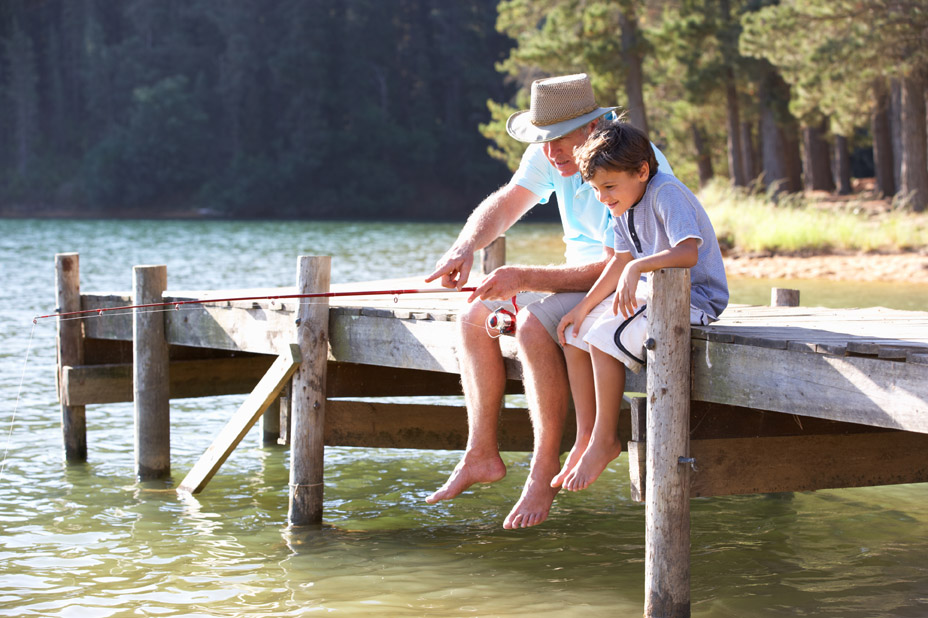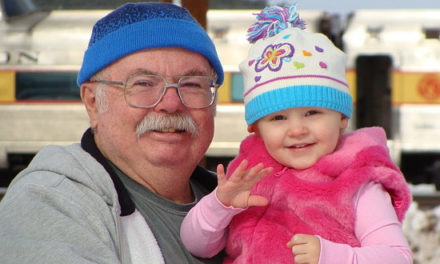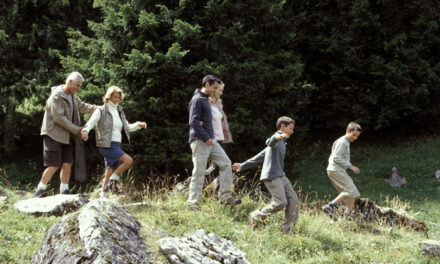by Brittany Macdonald
I’m a grandchild.
I’m a lot like your grandchildren, in fact, except more grown up. Then again, I’m probably not quite like your grandchildren because the type of childhood I had hardly seems to exist anymore.
My childhood memories are peppered with times in my Gramma’s kitchen. Gramma’s parents immigrated from Poland, meaning Polish was her first language. By the time I was standing in her kitchen rolling pierogies and making borscht, though, she only remembered a few phrases and songs.
Technically I may be only a quarter Polish, but that didn’t stop me from connecting deeply with my Polish heritage. Happy memories around food can do that. So can language. My four siblings and I were taught to sing “Sto Lat,” the Polish version of “For He’s a Jolly Good Fellow,” for birthdays and holidays, and to this day a birthday doesn’t feel complete unless we’ve sung one round of the song in English and one in Polish.
Heritage, connection, purpose, and meaning don’t develop by accident. Hours of cooking with my grandmother, collecting pine cones with my Grampa, and challenging my brother to round after round of pool in the basement helped foster that for me.
But how often does that sort of face-to-face quality time happen now?
Today, kids, teens, and young adults spend more time on their phones and tablets than they do engaging with family or friends. Best estimates on teenage screen time range from 2-6 hours a day, with pre-teens burning even more time than that. Grandparents like mine may shake their heads and lament about the “kids these days,” but teens and kids are learning from the generation before them. Their parents average nearly 11 hours on a screen each day and check their phone every 10 minutes.
Family structures have evolved too. Approximately 26% of American children are being raised in single-parent homes and an estimated 2.7 million grandparents are now the primary caregiver for their grandkids. Societal pressures and the increasing cost of living have made their mark on traditional, stable two-parent homes too, leaving many kids to be raised primarily by technology, teachers, or peers rather than by engaged parents. That heritage, connection, purpose, and meaning don’t stand a chance.
The statistics show a starkly different reality than the one I grew up in. Kids are not receiving the guidance and mentorship they need to navigate the messy transition from childhood to adulthood: they and their parents are often too busy checking their phones. The most crucial years for life-on-life impact end up slipping away in a haze of blue screen light.
Making the transition from kid to young professional is difficult and the magnitude of that transition for millennials and generation Z-ers is particularly significant, as they’re forced to make it almost entirely on their own. Traditional learning through mentors has gone by the wayside as society relies on technology to set educational priorities, facilitate digital-based relationships and, increasingly, to disengage from the world. Google is now our chaotic training ground.
Statistics aside, the reality doesn’t have to be that way. I know because I have seen change happen. I have had the privilege of working with thousands of teens and young adults as a mentor and coach. Time after time, the biggest reason we see young adults turning to technology is to find purpose and meaning. Yet when challenged to think about their goals, their future, and encouraged to realize what they are capable of, many young people are more than willing to put down the screens and engage with the world around them.
My Story
I was lucky. I had parents and grandparents who guided me. Still, transitioning to adulthood was rocky and there was no college course I could take to teach me how to find time for laundry or navigate paying my bills.
So I got a coach.
Initially I planned to work on time management, class scheduling, and making sure I didn’t miss deadlines, but my coach challenged me to think bigger. What is my purpose? Why am I here? What do I have to offer the world? How can I create a vision big enough to get excited about? What steps should I take that will move me in that direction?
Being coached helped me see my potential and pushed me further than I could have gone alone. I went from having no idea what I wanted to major in nor the ability to focus on assignments to having clarity about my passions and the motivation to complete tasks. Coaching inspired me to finish my bachelor’s degree in less than two years because I was now excited about the future.
Fast forward to today. After experiencing the impact of coaching in my own life, I decided to pursue coaching as a career, one I intend to stay in for the rest of my life. I’m growing a successful business with a team of other coaches, own a home in my dream state of Colorado, invest intentionally in my family and community, attend church most weekends, and usually remember to call my grandparents every few weeks, all because of personal mentorship and coaching.
Unfortunately, my story of purpose, passion, and success is not the norm for teenagers and young adults today. The norm looks very different.
The New Norm
Cody was 17 years old when he first started working with a life coach. He was creative, passionate, and had big plans for life. He also loved to play video games, devoting most of his free time to unwinding in front of a screen in an effort to relieve the stress of his busy schedule.
In spite of that, he complained about never having enough time to accomplish tasks, which further increased his stress. No amount of pestering by his parents helped, until Cody was challenged by his coach to start tracking his time. He was shocked when he realized that he spent a full 24 hours each week playing video games.
Cody isn’t unique. Whether through video games specifically or technology in general, more and more young adults are moving away from real-life, personal interactions and are turning instead to technology to relieve stress, stave off boredom, and seek connection and meaning.
The result can be devastating. Recent studies link technology use with depression and suicide. Teens who spend over five hours each day on their devices are 71% more likely to be at risk for suicide. Meanwhile, suicide rates among teens have increased by at least 70% over the past ten years.
What’s the Solution?
While significant mental health challenges are best addressed through professional counseling, coaching can often help young adults before they ever reach the danger level. My clients consistently tell me they have more clarity about their future, more excitement about their day-to-day lives, and greater motivation to persevere despite challenges with coaching, and my company’s metrics prove it. Resilience (the ability to bounce back from difficulties), problem solving, and personal awareness/satisfaction typically increase by over 300%, meaning each young adult is better equipped to pursue their goals and overcome setbacks along the way.
There are no easy answers to the prevalence of child and young adult depression, suicide, and general lack of connection, but there still are answers. Young people need old-fashioned human connection that has been usurped by technology. They need mentors who are willing to show up and do the next small thing to help them build purpose.
Finding practical ways to engage and mentor your grandchildren is not simply a nice idea; it just may end up saving their lives.
4 Ways Grandparents Can be Good Mentors
Whether or not you see yourself as a mentor, it’s likely that your grandkids look up to you, just like I did—and still do—to mine. Therefore, you have the opportunity to invest and impact their future in important ways.
1. Do Things Together
Whether it’s something simple like playing a game or more complicated like taking a trip, never underestimate the power of spending actual time together.
Try to find activities that would appeal to them as well as to you. If you find it hard to pull them away from their phones, ask to see their favorite apps or to introduce you to a game. Once you’ve shown interest in their interests, invite them to put down the device and join you in one of your favorite activities.
2. Stay Cool
With technology constantly changing and morphing, it can be difficult keeping up with the latest trends in staying connected. Instead of a phone call or email, try a video chat. FaceTime calls are more likely to appeal to your grandchildren. If one or either of you don’t have an Apple device, then Skype, Facebook Messenger, or WhatsApp are other popular video call options you can try.
While social media apps like Snapchat and Instagram may seem beyond the realm of mastery for anyone but the techno generation, a significant majority of teens are spending their time there instead of on the more classic Facebook. Even if you don’t post often (or ever!), signing up for an account on one or both of these platforms and then friending/following your grandkids can give you insight into their world. And if you find these apps confusing, just ask your grandchildren to help! Most likely they’ll be happy to explain their digital world to you.
3. Give It Time
If you aren’t sure how to best engage your grandkids, give it time. Relationships are a process and require consistency and intentionality.
Instead of constantly asking your grandkids to get together with you or insisting they answer your calls, try a video call every week or two, invite them to special events, or just send them a text letting them know you’re thinking about them.
Stay encouraged by realizing that it may take a few months of intentional investment before you see a real response.
4. Invest in an Outside Coach or Mentor for Your Grandchild
Remember Cody? His parents were involved, but he had grown tired of hearing their feedback and so tuned it out. Then he started meeting regularly with a coach. Suddenly being challenged to own his decisions, Cody decided to put his video games in a cardboard box for a month and see what would happen.
He never went back. Instead, he started tackling college classes in high school. He spent more time practicing martial arts, which had always been one of his passions. He got a part-time job. He now had money and purpose, and he was developing skills, exercising, and pursuing further education. He was empowered to pursue the goals he had always dreamed of achieving.
The Bottom Line
The potential of one-on-one influence to change lives is enormous. Grandparents, parents, teachers, and mentors are all essential features in the lives of young adults, but something powerful happens when a young person has someone—like a coach—who is wholly focused on helping them take control of their lives, own their decisions, achieve their goals, and build meaning.
Again and again, with thousands of clients, I and my coaching team have seen that mentors and coaches are the number-one key to a young adult’s success. They changed my life. I took the investment and drive instilled in me by my mentors to the next level by working with a coach to determine my passion and then go after it with everything I had.
They changed Cody’s life too. Once he came to his own conclusion that video games were swallowing up his time, he was able focus on turning all his ideas into reality. Purpose and passion began to drive his daily decisions.
If you are not sure how to impact your grandkids, just start somewhere. Mentorship doesn’t need to be complicated. It can simply mean making an intentional effort to show up. Take that next smallest step by making a call, asking a question, or baking cookies together.
Then, to help even more, guide them to a life coach who can continue to champion them along the challenging road to adulthood.
It will change their lives.

Brittany has been mentoring and coaching young adults her entire professional career. As a Professional Certified Coach through the International Coach Federation and the CEO of Apex Generation Leadership (AGL), she leads a team of coaches in building bridges between generations through the power of life coaching. In her free time, she enjoys all that her home state of Colorado has to offer, from hiking to skiing to discovering new coffee shops with friends. She also makes time for regular phone calls and visits to her grandparents. Learn more about how coaching can change the lives of your grandchildren at www.coachingforgood.org/grandkidsmatter.





